STOP ASIAN HATE PART TWO
making a new page for this the other one is pretty filled.
i found some disturbing and very horrible and sad incidences.
don't read if uncomfortable with these topics.
Asian woman, 65, knocked down, repeatedly kicked as witnesses appear to watch.
The New York police Hate Crimes Task Force is investigating Monday's attack outside a luxury apartment building.
This was reported and posted on 03/30/21
A 65-year-old Asian American woman was knocked to the ground Monday and repeatedly kicked outside a luxury New York City apartment building as staff members appeared to watch without coming to her aid, according to surveillance video of the incident.
The New York Police Department's Hate Crimes Task Force is investigating the assault, and the staff members who witnessed it have been suspended, officials said.
The attack unfolded about 11:40 a.m. Monday in the 300 block of West 43rd Street, which is in the Hell's Kitchen neighborhood of Manhattan, police said.
Police released video that captured a man kicking the victim in her stomach, causing her to fall to the ground. The man then stomped the woman's head multiple times while making anti-Asian statements, police said.
Video appeared to show that as the assault continued, at least three people in the lobby of the apartment stood by and watched. One of them closed the door as the assailant walked away and left the woman on the ground, the video showed.
"The victim sustained a serious physical injury and was removed by EMS to NYU Langone Hospital," police said in a statement. She was discharged Tuesday.
Police released photos of the man, who remains at large. Police hope someone can help them identify him.
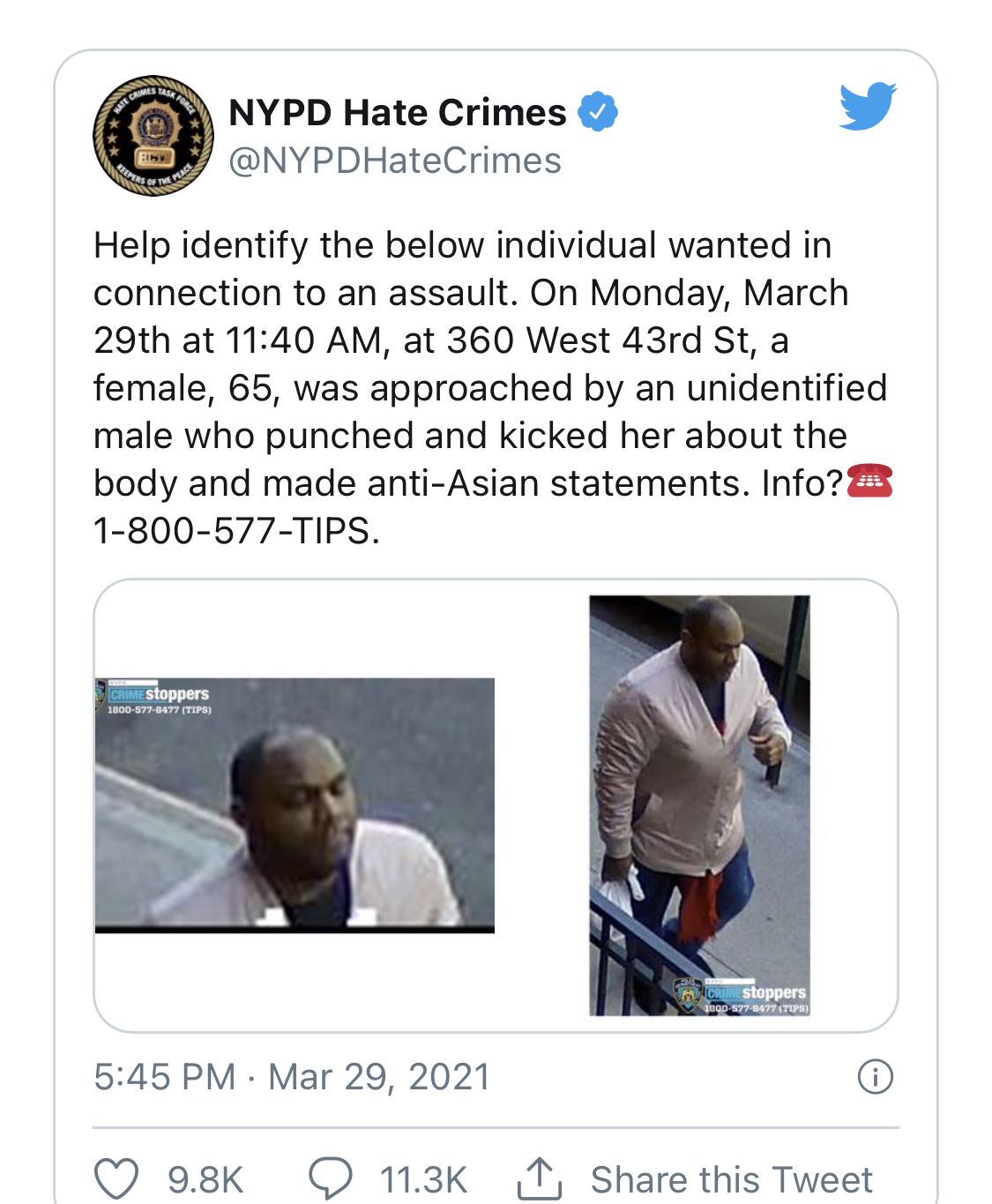
Early Tuesday, the Brodsky Organization, the company that manages the luxury apartments, said in a statement posted on Instagram that it "condemns all forms of violence, racism, xenophobia, and violence against the Asian American community."
The company said that "the staff who witnessed the attack have been suspended pending an investigation in conjunction with their union" and that it was working to identify a "third-party vendor present during the incident so that appropriate action can be taken."
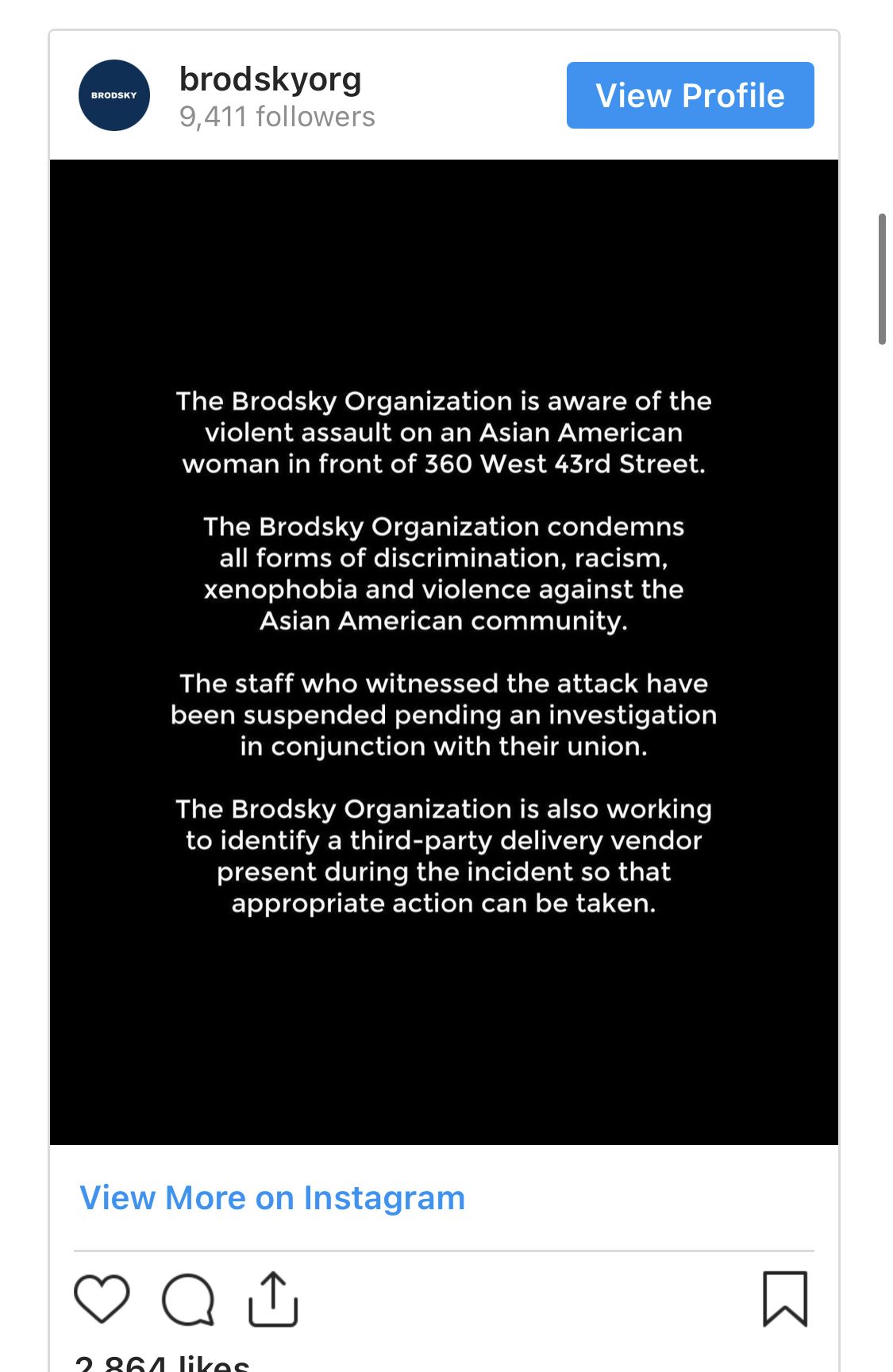
Officials decried the attack, which City Council Speaker Corey Johnson described on Twitter as "absolutely vile."
"These attacks against Asian-American New Yorkers must end," he tweeted. "Hate has no place here and we must always call it out when we see it."
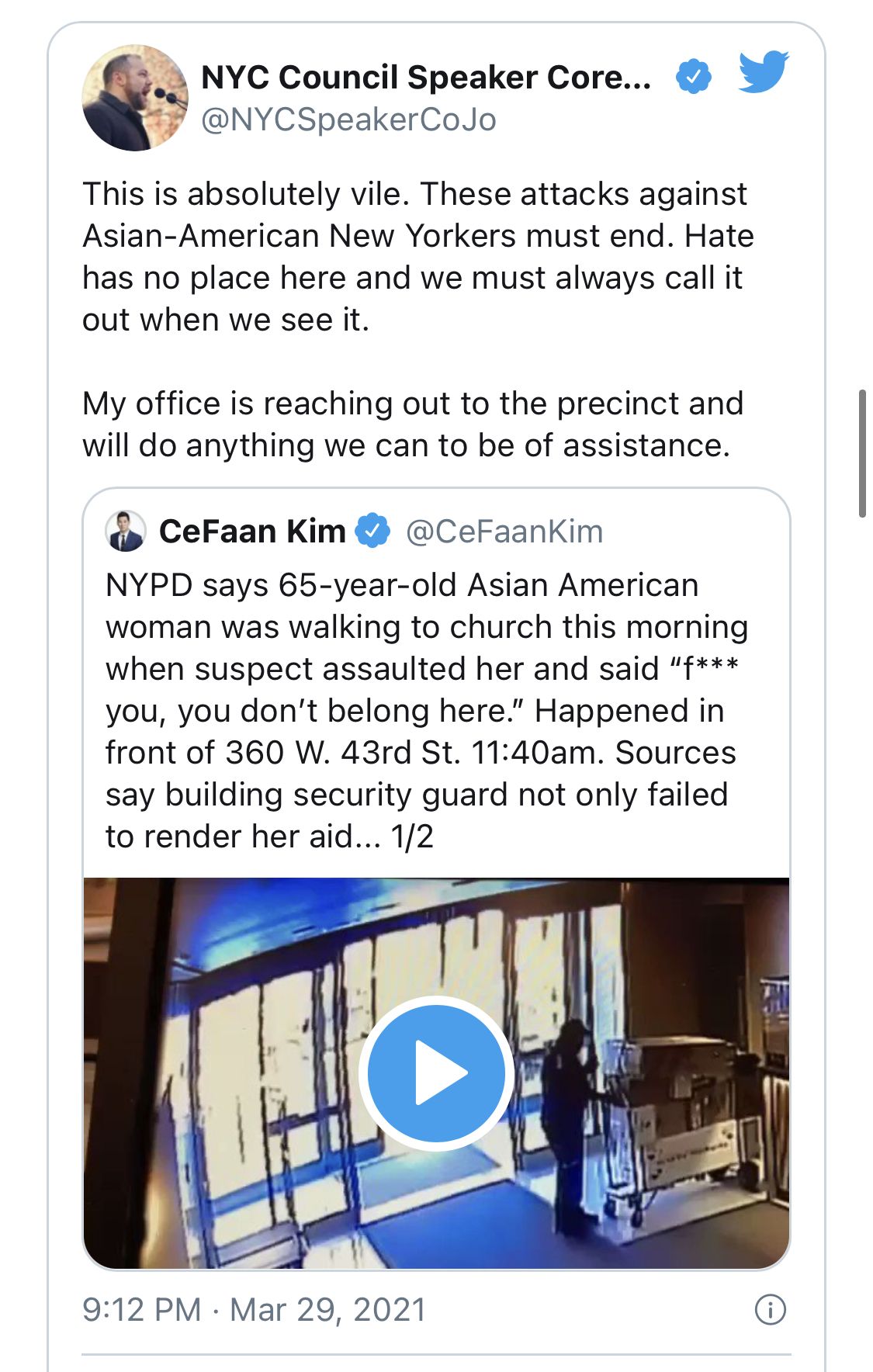
check out the video on Twitter if you would like. @CeFaanKim
City Comptroller Scott Stringer, a mayoral candidate, said the attack was "absolutely disgusting."
"Asian Americans belong in New York and are an integral part of our city," Stringer tweeted. "We have to continue to speak out, we have to continue to protect our AAPI neighbors, and we have to act immediately to #StopAsianHate."
The incident, one of two violent attacks captured on camera in New York City recently, was the latest in a wave of crimes against Asian Americans across the country. An analysis of police department statistics this month revealed that 16 major cities across the U.S. experienced significant spikes in anti-Asian hate crimes last year.
—————————
ANTI-ASIAN VIOLENCE RESOURCES
Below you'll find resources that have been gathered to help individuals educate others, take action, donate, and more.
Anti-Asian racism and violent attacks on Asian elderly have only increased in recent months. Since COVID-19 became news in the United States, hate speech and violence against the AAPI community has run rampant. In February 2021, attacks, particularly on elderly Asian Americans, have spiked. Unfortunately, many of these incidents are not being reported and are invisible to major media outlets. We hope to change this by offering the following resources with our community. Please join us in taking action whether it's by educating yourself and others around you or donating to non-profit organizations.
https://anti-asianviolenceresources.carrd.co
STATISTICS
40% of U.S. adults believe "it has become more common for people to express racist views toward Asians since the pandemic began" (Source: Pew Research)
More than 1,800 racist incidents against Asian Americans were reported between March and May of 2020, according to a United Nations Report (Source: CBS News)
Stop AAPI Hate National Report (March 19, 2020 - February 28, 2021) has received a staggering 3,795 reports of anti-Asian hate incidents. (Source: Stop AAPI Hate)
BYSTANDER INTERVENTION TRAININGS

To combat the current rise in harassment and discrimination and to also proactively prepare for the future increase of hate incidents, Advancing Justice | Chicago is partnering with New York-based nonprofit Hollaback! and CAIR-Chicago to plan and implement an aggressive scaling up of locally-led bystander hate incident intervention trainings for community members.
Attend a Training
www.advancing-justice-chicago.org
Thursday, April 1, 4:00PM: FULL
Wednesday, April 7, 10:00AM: FULL
Thursday, April 8, 1:00PM: FULL
Tuesday, April 13, 5:00PM: FULL
Wednesday, April 21, 3:00PM: FULL
Thursday, April 22, 4:00PM: FULL
Wednesday, April 28, 2:00PM: FULL
Thursday, April 29, 2:00PM: FULL
Tuesday, May 4, 9:00AM: FULL
Wednesday, May 5, 5:00PM: FULL
Thursday, May 13, 7:00PM: Register here
Monday, May 17, 12:30PM: Register here
Our public webinars have a maximum capacity of 500 attendees
If your organization or community group would like to learn more or sign up for a training, please email [email protected].
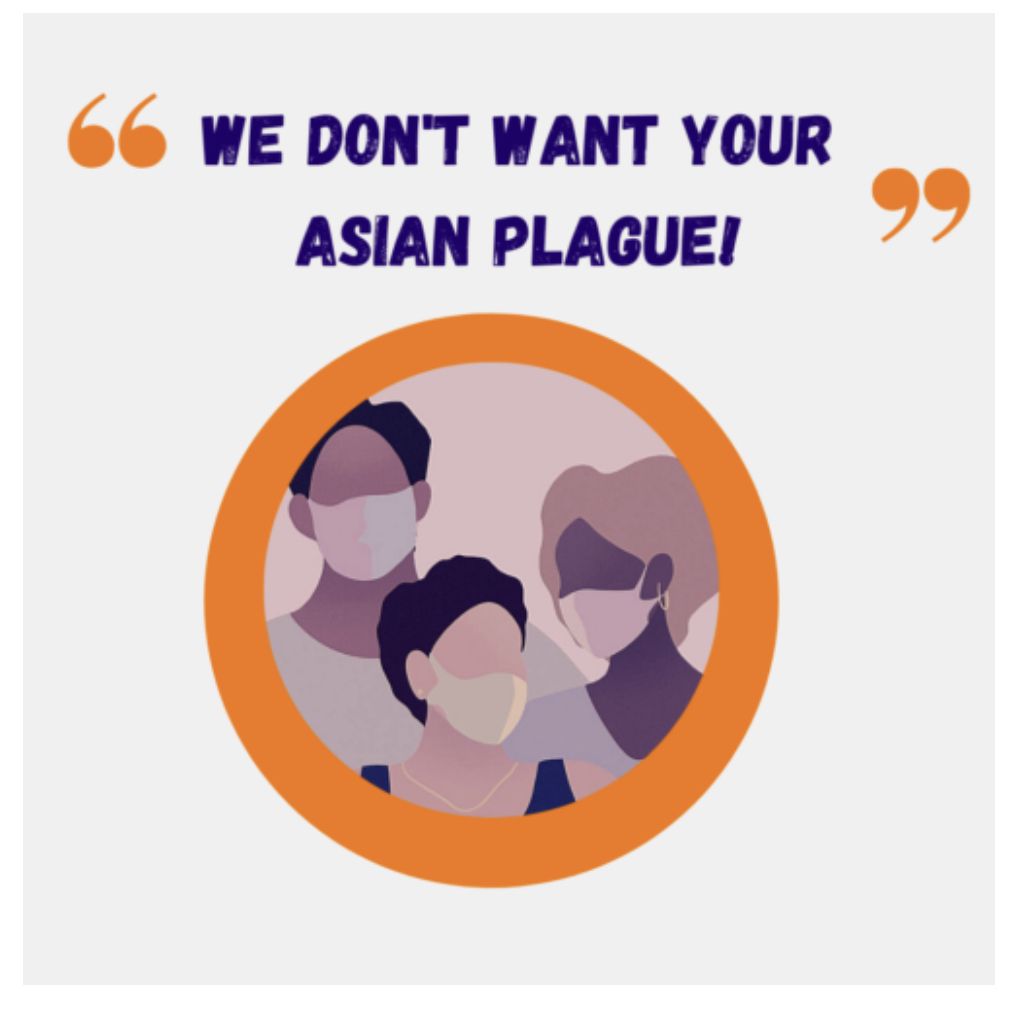
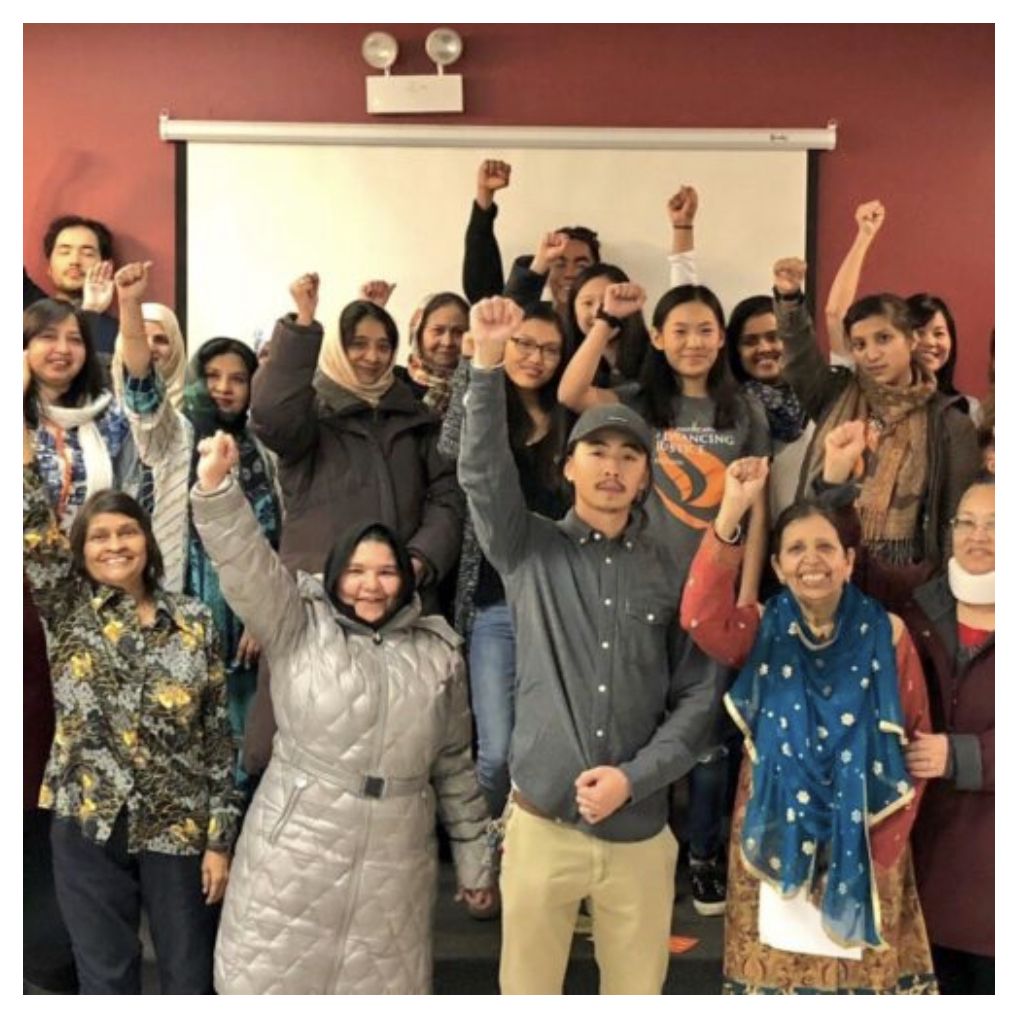
Our Program
In this one-hour, interactive online training, participants will:
learn about the types of disrespect and dangers that Asian and Asian American folks are facing right now and throughout history — from microaggressions to violence.
understand what to look for in scenarios and the positive impact that bystander intervention has on individuals and communities.
talk through five strategies (5Ds) for intervention and how to prioritize your own safety while intervening.
practice using the 5Ds so that participants are confident intervening the next time they witness Anti-Asian harassment.
From BTS to Britain, Anti-Asian Racism Gets New Attention Outside the U.S.
Spikes in harassment and violence against Asians trigger reckonings in Europe, Australia, Canada and elsewhere
SEOUL—Activism and awareness surrounding anti-Asian violence have started fanning out world-wide, encouraged by U.S. protests following the Atlanta-area spa shootings.
People from an array of Asian communities and their supporters are taking to social media, rallying in the streets and speaking out—some for the first time. The mobilization has helped create a megaphone for issues that went mostly unnoticed for decades, but were amplified during the coronavirus pandemic and erupted in recent weeks.
South Korean band BTS took to Twitter on Tuesday, sharing how its members had endured expletives and mockery for how they looked. "What is happening right now cannot be disassociated from our identity as Asians," according to the group's official account, in a post that generated roughly 3 million retweets and likes.
Rallies against anti-Asian hate have sprung up in recent weeks in Canada, Germany, France, Netherlands and New Zealand. The most-searched query related to hate crimes is now "Asian hate crimes," according to Google Trends, with interest surging 1,650% in the past 12 months.
—————————
"...HE WAS PRETTY MUCH FED UP, AND KIND OF AT [THE] END OF HIS ROPE, AND YESTERDAY WAS A REALLY BAD DAY FOR HIM AND THIS IS WHAT HE DID," CAPT JAY BAKER OF THE CHEROKEE COUNTY SHERIFF'S OFFICE. (SOURCE: THE HILL)
THIS "BAD DAY" ENDED THE LIVES OF 8 INDIVIDUALS AND PERMANENTLY CHANGED THE LIVES OF THEIR FAMILIES.
SAY THEIR NAMES. SHARE THEIR STORIES.
SOON CHUNG PARK, 74
SUNCHA KIM, 69
YONG AE YUE, 63
HYUN JUNG GRANT, 51
XIAOJIE TAN, 49
DELAINA YAUN, 33
DAOYOU FENG, 44
PAUL ANDRE MICHELS, 54
(SOURCE: THE WASHINGTON POST)
————————-
String of attacks against older Asians leaves big city Chinatowns on edge
Violence, robberies and burglaries have some Asian Americans afraid to leave their homes and brought a greater police presence to Bay Area neighborhoods.
A wave of attacks on older Asians has stoked fear in some big city Chinatowns, leading authorities to assign extra officers before the Lunar New Year on Friday and take other measures to combat a problem that has worsened since the start of the year.
San Francisco is assigning more police to its Chinatown this week, for example, after older Asians have been targeted in a wave of robberies, burglaries and assaults. Area officials have advised residents to be vigilant after three violent attacks on Jan. 31 alone. One incident made national headlines as security cameras captured a 91-year-old man being pushed to the ground unprovoked.
None are being investigated as hate crimes, authorities said.
How Racism and Sexism Intertwine to Torment Asian-American Women
Many viewed the shooting rampage in Atlanta that left eight people dead as the culmination of a racialized misogyny that they say has long been directed at them.
ATLANTA SPA SHOOTINGS
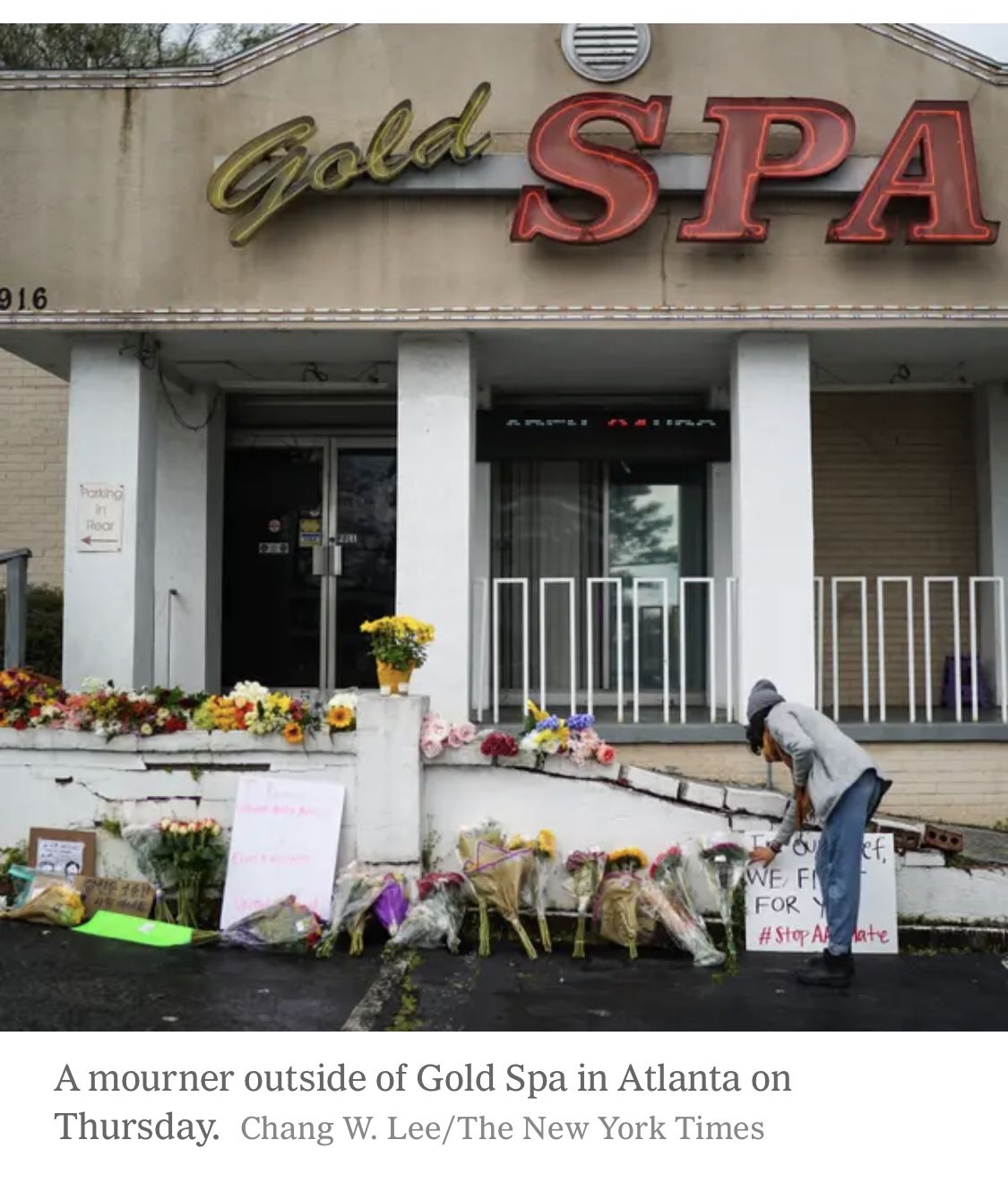
March 18, 2021
阅读简体中文版閱讀繁體中文版Leer en español
After eight people, six of them Asian women, were fatally shot this week in a rampage near Atlanta, a law enforcement official said that in the gunman's own words, his actions were "not racially motivated," but caused by "sexual addiction."
The official, Capt. Jay Baker of the Sheriff's Office in Cherokee County, where one of the three massage businesses targeted by the gunman was located, cautioned that the investigation was in its early stages. But the implication was clear: It had to be one motive or the other, not both.
That suggestion was met with incredulity by many Asian-American women, for whom racism and sexism have always been inextricably intertwined. For them, racism often takes the form of unwanted sexual come-ons, and sexual harassment is often overtly racist.
With reports of anti-Asian attacks surging after the Trump administration repeatedly emphasized China's connection to the Covid-19 pandemic, there is evidence that most of the hate, unlike other types of bias crime, has been directed at women.
"People on here literally debating if this was a misogynistic attack against women or a racist attack against Asians," Jenn Fang, the founder of a long-running Asian-American feminist blog, Reappropriate, wrote in a scathing Twitter thread. "What if — wait for it — it was both."
Captain Baker's briefing on the attacks on Wednesday included an assertion that the accused gunman, who is white, had been having "a really bad day," which many women took as yet another way of excusing violence against them. His comments were widely criticized, and he was found to have promoted sales of an anti-Asian T-shirt.
The Sheriff's Office later said in a statement that the captain's remarks were "not intended to disrespect any of the victims" or to "express empathy or sympathy for the suspect."
But the apology seemed to do little to quell a sense that the authorities were missing the point.
"Law enforcement and society in general tends to really not understand how racism and hate and prejudice is directed toward Asian-Americans, and certainly not understand how it's directed toward Asian-American women," said Helen Zia, an activist and author who has tracked anti-Asian violence. "So the instant reaction is generally to discount and dismiss it."
There is a long history of misogyny and violence directed specifically at Asian women by men of all races — including Asian men. Asian-American women have long been stereotyped as sexually submissive, portrayed in popular culture as exotic "lotus blossoms" and manipulative "dragon ladies," or as inherently superior to other women in a way that erases their individuality. They have been subjected to backlash for any failure to conform to those stereotypes and trolled for choosing non-Asian partners.
Despite vast economic inequality among Asian-Americans, they are often assumed to be accomplished, financially successful members of a "model minority," a fabrication sometimes used to denigrate other racial groups by contrast.
Sung Yeon Choimorrow, the executive director of the National Asian Pacific American Women's Forum, an advocacy group, said that when she first came to the United States to attend college in 2000, she was "stunned, dumbfounded, horrified" by the way she was frequently approached by male strangers who professed to love Korean women.
"It is the 'Me so horny, I love you long time,' in like weird accents, and 'Oh, are you Korean? I love Korea,'" she said, adding that she began to wonder if American men were crazy. They would "go into this whole thing about how they served in the military in Korea and how they had this amazing Korean girlfriend that was just like me. And will I be their girlfriend?"
The men, she said, ranged in age from the very young to the very old, and seemed never to understand that their attention was not flattering. "I've experienced racism. I've experienced sexism. But I never experienced the two like that as I have when I came to the United States."
She said many Asian-American women viewed Tuesday's shooting rampage as the culmination of this racialized misogyny.
"I'm telling you, most of us didn't sleep well last night," she said. "Because this was what we had feared all along — we were afraid that the objectification and the hypersexualization of our bodies was going to lead to death."
Federal data suggest that across the country, the victims of most violent hate crimes are men. Yet a recent analysis by a group called Stop AAPI Hate, which collects reports of hate incidents against Asian-American and Pacific Islander communities, said that out of nearly 3,800 incidents recorded in 2020 and 2021, more than two-thirds of the reports came from women.
Hate crimes against Asian women are almost certainly undercounted, and Ms. Zia said one reason is that those with a sexual dimension tend to be classified as sex offenses, in effect erasing the racial aspect. Stereotypes of Asian women as submissive may embolden aggressors, she said. "We're seen as vulnerable," she said. "You know — the object that won't fight back."

Very little is known about the motives of the Atlanta gunman, but organizations that track hate crimes have paid increasing attention to misogyny as a "gateway drug" to other types of extremism, such as violent racism, in the wake of mass shootings at yoga and fitness studios frequented by women and the slaughter of 10 people in Toronto in 2018 by a self-described "incel," or involuntary celibate.
The deaths of 77 people in Norway in a shooting and bombing attack in 2011 were widely portrayed as a result of right-wing extremism, but the attacker, Anders Breivik, also viewed feminism as a significant threat.
In 2018 the Southern Poverty Law Center and the National Consortium for the Study of Terrorism and Responses to Terrorism began to track what they call male supremacist terrorism, fueled by aggrieved male entitlement and a desire to preserve traditional gender roles, according to a brief by the International Centre for Counter-Terrorism. The Anti-Defamation League published a report called "When Women Are the Enemy: The Intersection of Misogyny and White Supremacy."
Scholars say the fetishization of Asian women, and a corresponding emasculation of Asian men, have long histories shaped by United States law and policy. The Page Act of 1875, which ostensibly banned the importation of women for prostitution, effectively prevented Chinese women from entering the United States, while laws prohibiting mixed-race marriages left male Chinese immigrants perpetual bachelors.
Kyeyoung Park, a professor of anthropology and Asian-American studies at the University of California, Los Angeles, said Asian immigrants have historically been viewed exclusively through the lens of their labor or businesses.
In the case of the spas in Georgia, she said capitalism based on racial exploitation has been intertwined with the sexualization of Asian women, and particularly Korean women, over many decades. The police have not said whether any of the three spas had ties to sex work.
"I think the origin of these massage parlors can be traced back to Korean War brides and military wives," Dr. Park said.
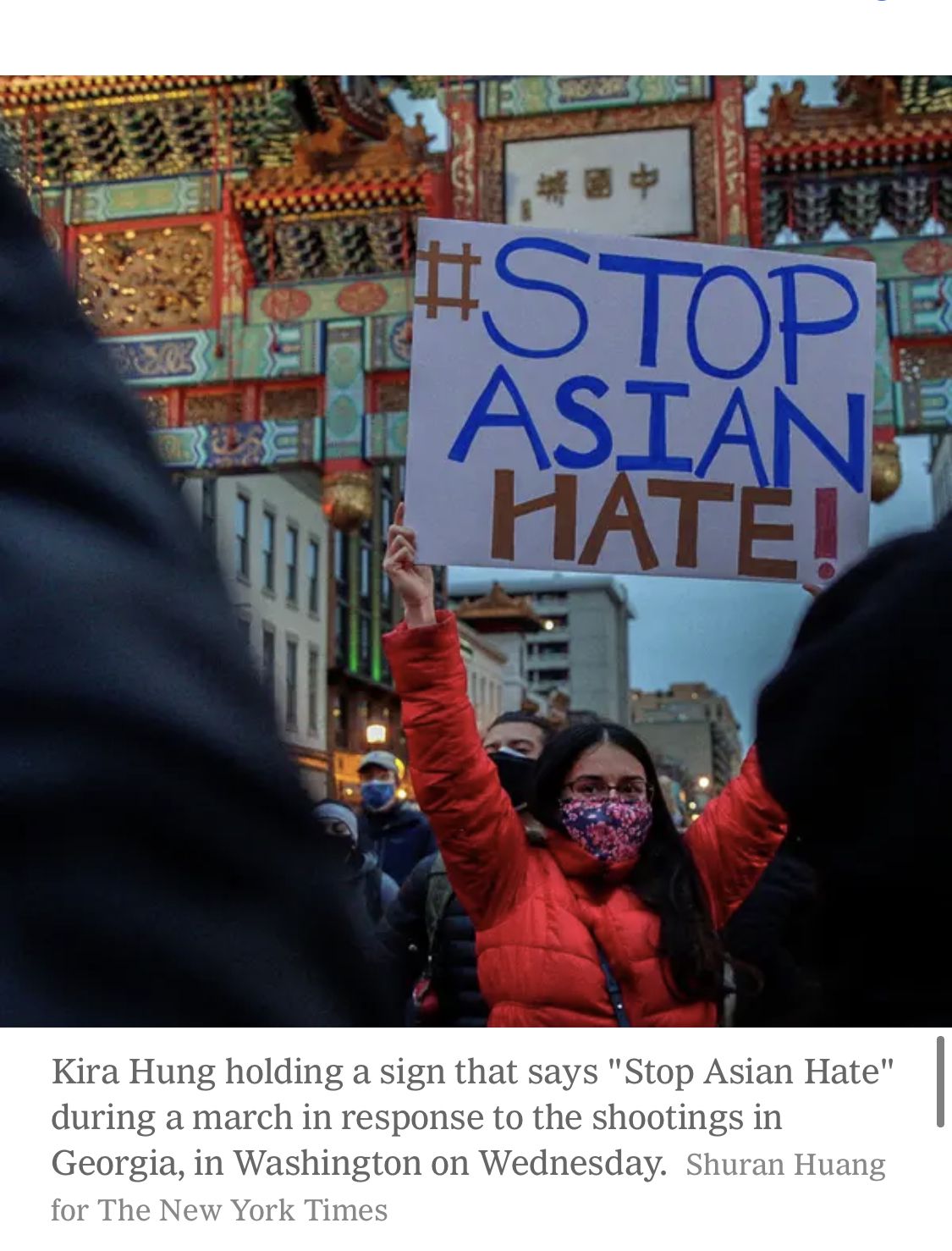
Overseas, poverty and the privations of war gave rise to a prostitution industry that provided inexpensive sex to American servicemen in Korea, the Philippines, Thailand and Vietnam, compounding stereotypes of Asian women as exotic sex objects or manipulators trying to entrap American husbands.
Sexual imperialism was not limited to Americans; the Japanese also forced Chinese, Filipino and Korean women into prostitution as so-called comfort women in the 1930s and '40s.
Many women who were in the sex trade were brought to the United States as brides, and some of them who were later separated or divorced from their husbands started massage parlors, a history that likely helped shape a perception of all Asian-run spas as illicit and the women who work in them as sex workers, Dr. Park said.
The fetishization of Asian women was reinforced in popular culture, most notably with the lines spoken by a sex worker in a scene in "Full Metal Jacket," a Vietnam War movie, as two soldiers try to bargain down her price: "Me so horny. Me love you long time."
Divorced from their origin, those lines have become a come-on used in what Ellen Wu, a historian at Indiana University Bloomington and the author of "The Color of Success: Asian Americans and the Origins of the Model Minority," called a "racially specific type of catcalling."
"A few words pack an entire history into a sentence," she said.
Several advocates said they had spent the last year combating the notion that hate and violence against Asian-Americans, and particularly Asian-American women, were something new.
"There are many women who have died because of sexual violence directed at them that was also racialized, but it has never been at the scale where the whole country is watching and talking about it," Ms. Choimorrow said. "And what really upsets me is that it has taken something this tragic for me to be able to tell the story."
Jill Cowan contributed reporting.
Shaila Dewan is a national reporter and editor covering criminal justice issues including prosecution, policing and incarceration. @shailadewan
More on www.nytimes.com
+
ANTI-ASIAN HATE CRIMES ARE UP 1900%. LET'S TALK ABOUT IT
It was around this time last year that the new COVID-19 virus began to dominate our everyday conversation.
As cases started rising, so did fear.
And so did racism.
Near the beginning of the pandemic, as the racist rhetoric and violence towards Asian Americans began to rise, I wrote a piece titled "Being an Asian-American In Trump's Covid-19 Pandemic."
As an adopted Asian American, specifically Chinese-American, I have always struggled with navigating my identity and further understanding of the place and privilege that I have in this nation.
Writing this article provided me an outlet to be honest and vulnerable about my personal experience during this time as an AAPI (AAPI refers to Asian Americans and Pacific Islanders) and attempt to put into words the complex and intense emotions I was feeling about all that was occurring. It was meant to share a perspective that I wasn't seeing in mainstream media and I hoped that it would give a voice for other Asian Americans, one that they resonated with and in a way could make them feel less alone.
Further, I hoped that the raw perspective would help to gain some empathy, solidarity and action from other BIPOC communities and white allies.
However, here we are months later, and the Anti-Asian racism and violence against our people has not gone away. In fact, it is more prevalent than ever. And it still is not making the headlines.
The need for a reiteration of this message is disheartening to say the least.
Even more so, I doubt that this will be the last time this messaging is needed.
This past year, when life changed so dramatically for everyone, the racialized experience of everyday life for Asian Americans was intensified to a terrifying level and we must continue to express the abhorrent reality of it.
WE HAVE BEEN FIGHTING TWO PANDEMICS — COVID-19 AND RACISM.
Customers were denied service.
Asian-American owned businesses have been avoided.
Toddlers were stabbed in the grocery store.
A woman had acid thrown on her.
Businesses have been robbed and ravaged.
Individuals have been assaulted.
People have been killed.
Since the start of the pandemic, hate crimes against Asian Americans have gone up 1900%.
One Thousand. Nine Hundred. Percent.
There have been over 2800 racist and discriminatory incidents, and those are only the ones that have been reported.
One in four Asian American youth has experienced racism since the pandemic began.
Just at the start of this month (Feb 2021), in the span of one week, an 84 year old Thai man was assaulted and killed, a 61 year old Filipino man was slashed across the face, a 64 year old Vietnamese grandmother was robbed and assaulted, and a Chinese man was robbed and assaulted at gunpoint in front of his own home.
The WHO's official stance that new diseases be named by generic descriptive terms to not negatively impact peoples' lives and livelihoods had merit. The outrage that Asian Americans felt when racist rhetoric was being spouted on a national stage was justified. The fear that I, and many Asian Americans, felt and continue to feel has been vindicated.
Racism against Asian Americans is not new. COVID-19 did not create this racism and fear, but it did awaken it to unmistaken and unabashed levels.
The "leaders" that deliberately labeled the virus as 'an ethnicity' were calculated. Their words were chosen to intentionally conflate the virus with the Chinese government, Asian people and Asian culture. The racism embedded in this nation and its ignorant homogenous view of a race composed of 43 ethnic groups just heightened the damage they were actively looking to do.
Scapegoating us or labelling us as "diseased" or "unclean" because of cultural differences that western culture doesn't always understand has happened repeatedly throughout history.
Labelling us as "perpetual foreigners" and "model minorities" has been a form of constant gaslighting.
And the overall erasure of the Asian experience, violence and discrimination is predictable at best, but dangerous at worse.
From the Chinese Exclusion Act to Japanese Internment Camps, we have always been left out and targeted, with the oppression being overlooked. And our underrepresentation in everything from media to politics only abets the difficulty to be heard.
As a Chinese American who was adopted into a white home as an infant, I understand that my level of oppression is not the same or equal to other people of color in the United States.
But our experiences are valid.
I mourn, for not only the tragic losses in our communities but for the loss of acceptance that many felt they had.
As we talk about Anti-Asian hate, it is relevant to note that this is not just coming from one place. And I need to note that throughout the Black Lives Matter movement that gained momentum this past summer, there was Anti-Black sentiment and hate coming from some individuals in the Asian-American community.
But this is by no accident, and it all plays into the system of white supremacy that hurts us ALL. The Anti-Asian and Anti-Blackness is a direct result of white supremacy pitting minority groups against each other in an effort to divide and weaken us.
To the members of the Black and Brown communities — we are not the enemy. The tensions that divide us were only created by white supremacy to bolster and protect white supremacy. While our experiences in this nation and levels of oppression are different, the system that oppresses us is not.
We see the injustice that you face. We feel your fears in a newfound, painful way.
Our two groups will never know exactly what the other experiences, but we can still remain by the other in an unwavering fight against oppression.
The current spikes of attacks on the Asian American community arose right as the community was preparing for the Lunar New Year — a time meant to celebrate fortune, happiness and health. I hope that as we enter the year of the Ox, the Asian American community feels love and solidarity. I pray that people can celebrate safely, both from the virus and hate. I wish for a future when we can all live freely, from CDC regulations and from fear.
We are Americans. We are humans. And we are not a pandemic.
But racism is.
What to do from here:
Amplify and share these stories
Call your legislators and ask what they are doing to support the AAPI community
Check in on your AAPI friends and family.
Support your local Asian-American owned businesses
Order Takeout from your local Asian food restaurant
DO NOT BE SILENT.
Report to:
@StopAAPIHate
stopAAPIhate.org
Volunteer to help escort seniors in Oakland's Chinatown -- organizing being done by @Apen4ej
Books to read:
Minor Feelings
If They Come For Us
The Farm
The Joy Luck Club
Arrival
Dear Girls
Interior Chinatown
Know My Name
In the Country
The Woman Warrior
Sign:
Petition to hold the media accountable for covering these stories by @asianamericancollective
Organizations/Accounts to Support:
@HateIsAVirus
@NextShark
@AAPIWomenLead
@asianaaf
@stopaapihateyc
@asians4antiracism
@asianamericancollective
@smithsonianapa
@verasian.co
@ricefeed
@unapologeticallyasian_
@goldhouseco
@asianamericangirlclub
@theycantburnusall
@weareaanow
AAPI to follow to diversify your feed:
@angryasianfeminist
@annie_wu_22
@kimsaira
@amandangocnguyen
@michellekimkim
@mayleeshow
@jackfrootx
@intersectional.abc
@courtneyahndesign
@weija
Mental Health Resources:
Racial Trauma Toolkit by Boston College
Asian Pacific Islander Desi American (APIDA) Therapist Directory
@AsianMentalHealthCollective
@AsiansForMentalHealth has a comment thread of therapists willing to offer reduced/free sessions to the AA community
@SubtleAsianMentalHealth on Facebook is offering free 1:1 supportive listening sessions
@Laichientherapy is offering Asian Pacific American pay-as-you-wish group therapy
Crisis Line: 1-800-273-TALK
Asian Languages: 1-877-990-8585
Crisis Text Line: text CONNECT to 741741
We speak about Asian Americans as a single block. Here's how incredibly complex they are
By Nicole Chavez and Priya Krishnakumar, CNN
Updated 8:03 AM ET, Thu May 6, 2021
(CNN)Asian Americans are often labeled as a singular group, but the fastest growing population in the US is far from a monolith — and their complex history and cultures are often glossed over.
While they have been in America since the nation's infancy, Asian Americans continue being harmed by stereotypes like the "model minority" as well as racial violence. Much of the recent anti-Asian bias is a result of many people being ignorant of the group's history in the country and xenophobic messaging around the Covid-19 pandemic, experts and lawmakers say. Here's a look at how diverse Asians in America are and why we can't speak about them as a single block.
They trace their roots to dozens of countries
The term "Asian American" is an umbrella term for dozens of ethnic groups of Asian descent. It was first used in 1968 by University of California Berkeley graduate students as the name of an organization aimed at uniting Chinese, Korean, Japanese and Filipino Americans, among others to fight for political and social action.
An estimated 22 million Asian Americans live in the US, making up nearly 7% of the total population, US Census data shows. Those who self-identify as Chinese, Indian or Filipino ancestry make up the three largest Asian groups in the US, but no one ethnicity makes up a majority. For decades, Asians were grouped together with Pacific Islanders by government officials and advocates. Currently, there's an estimated 1.6 million Pacific Islanders living in the US, including many who identify as Native Hawaiian, Samoan and Guamanian or Chamorro.
About a third of Asians in the US live in California
Most Asians live around big cities in four states -- California, New York, Texas and Hawaii -- but for the most part, these cities are not home to a single ethnic group.
About a third of all Asians in the US live in California, where there's a large Chinese population in Los Angeles County along with Filipino, Korean, Japanese and Indian communities. Meanwhile, the Asians in Texas are Indian, Vietnamese, Chinese, Filipino, Korean and Pakistani. The Asian diaspora across the country is as diverse as the reasons that led people to migrate to the US.
There are approximately 309,000 Hmong people in the US. The largest share is in Wisconsin and Minnesota, where many settled as refugees in the 1970s.
In southern states like Louisiana and Mississippi, Vietnamese people make up the largest share of the Asian population. They resettled in the area following the Vietnam War.
They have the greatest income divide among racial and ethnic groups
Economically, Asian Americans are the most divided racial or ethnic group in the US, a Pew Research study found. High-income Asian Americans near the top of the income ladder earn 10.7 times as much as those on the opposite end of the income spectrum.
While Asian Americans have the highest education levels compared to Black, Hispanic and White people, their economic and education levels are very diverse. Some hold white collar jobs and others work in low-wage service sectors. For example, they represent 57% of 449,000 "miscellaneous personal appearance workers," a category that mainly includes nail salons, according to the US Bureau of Labor Statistics.
The highest earning Asians among those with a college degree and over 25 years old are Indian and Taiwanese, with a median household income of more than $100,000 per year. Meanwhile, the median household income for Burmese and Nepalese people is under $46,000 and $63,000, respectively.
Bạn đang đọc truyện trên: Truyen247.Pro